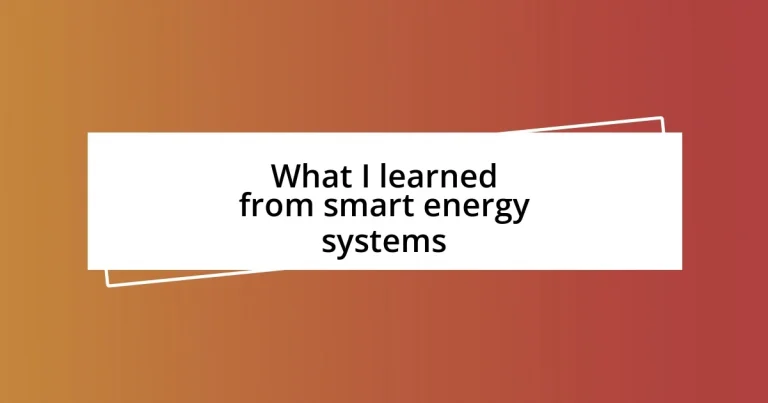Key takeaways:
- Smart energy systems leverage IoT and AI technologies for real-time data monitoring, optimizing energy use, and promoting renewable resources.
- Key benefits include enhanced efficiency, cost savings, and empowering consumers to make informed energy decisions.
- Real-world applications showcase the effectiveness of smart energy in renewable energy integration, EV charging, and smart building management, significantly reducing energy waste.
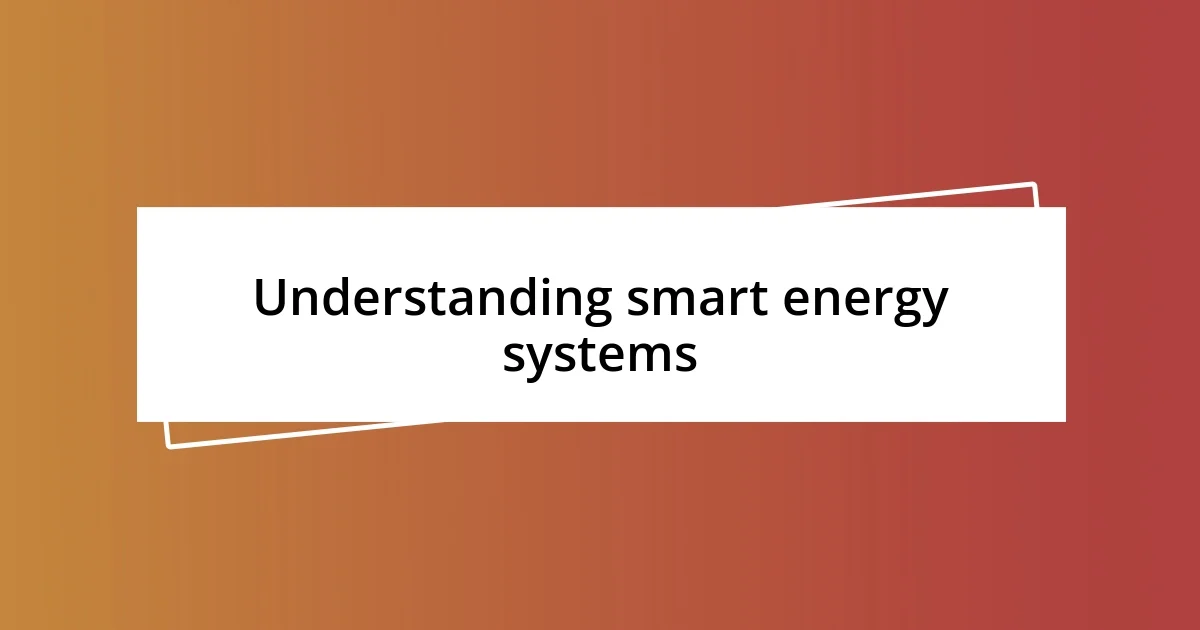
Understanding smart energy systems
Smart energy systems are fascinating because they combine technology and sustainability in innovative ways. I remember the first time I read about how they’re fundamentally changing energy management; I was both excited and a bit overwhelmed. These systems utilize advanced technologies like IoT (Internet of Things) and AI (Artificial Intelligence) to optimize energy use, which made me wonder: how could such integration reshape our everyday lives?
One key aspect that stood out to me is their ability to provide real-time data. Last year, I had a chance to see this in action at a smart city project. It was incredible to witness how data analytics not only improved energy distribution but also reduced waste. This experience made me think about how much we take for granted when flipping a switch; the efficiency behind it can be revolutionary with smart energy systems in play.
Moreover, these systems promote renewable energy sources, which is something I deeply care about. The emotional connection I feel when thinking about a future powered by clean energy has driven my passion for this topic. Have you ever thought about what a difference it would make if we could harness the sun and wind more effectively? Understanding smart energy systems isn’t just tech talk; it’s about envisioning a world that prioritizes sustainability and efficiency—a world I believe we can create together.
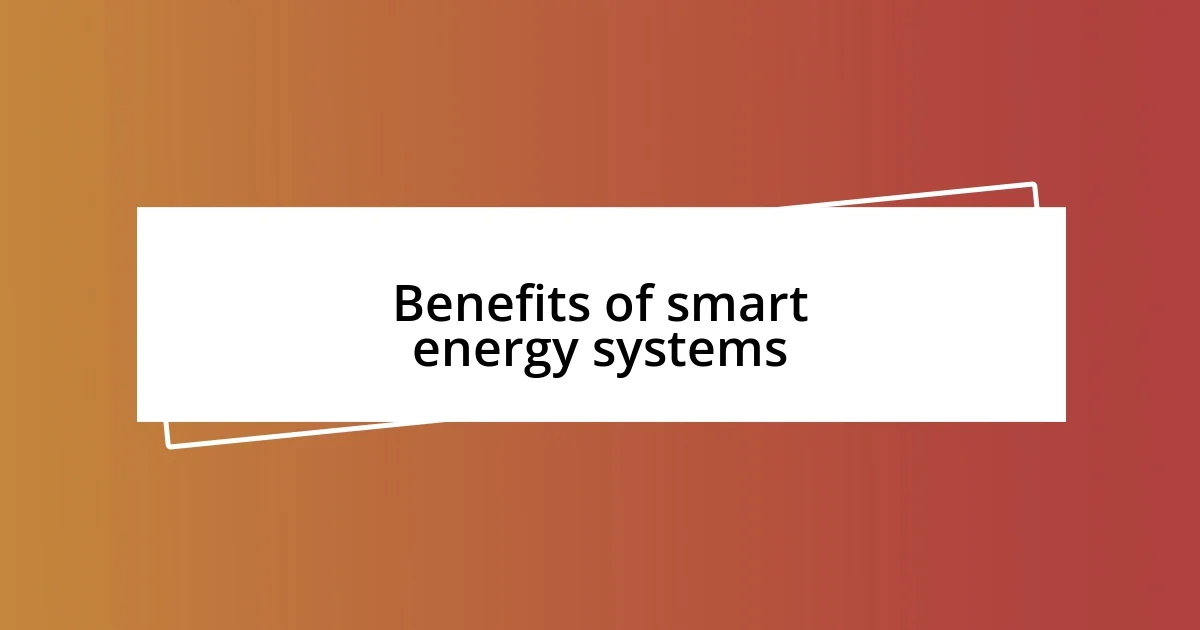
Benefits of smart energy systems
The benefits of smart energy systems are vast and impactful. One of the most striking advantages I’ve encountered is the potential for significant cost savings. During a visit to a friend’s home last summer, I was amazed to see his energy bills drop by nearly 30% after he upgraded to smart meters and home automation. It was a real eye-opener for me; not only did he save money, but he was also using energy more consciously, leading to a reduced carbon footprint.
Here are some key benefits I’ve identified:
- Enhanced Efficiency: Smart systems monitor and optimize energy usage, minimizing waste.
- Real-time Data Tracking: This allows users to adjust their consumption patterns instantly.
- Integration of Renewables: They seamlessly manage energy generated from renewable sources, like solar and wind.
- Predictive Maintenance: By anticipating issues, they reduce downtime and repair costs.
- Empowerment of Consumers: Users gain control over their energy consumption, leading to more informed decisions.
It’s fascinating to see how the integration of simple technologies can create a ripple effect on our wallets, our environment, and our way of life. Just imagining a future where this is commonplace gets me excited!
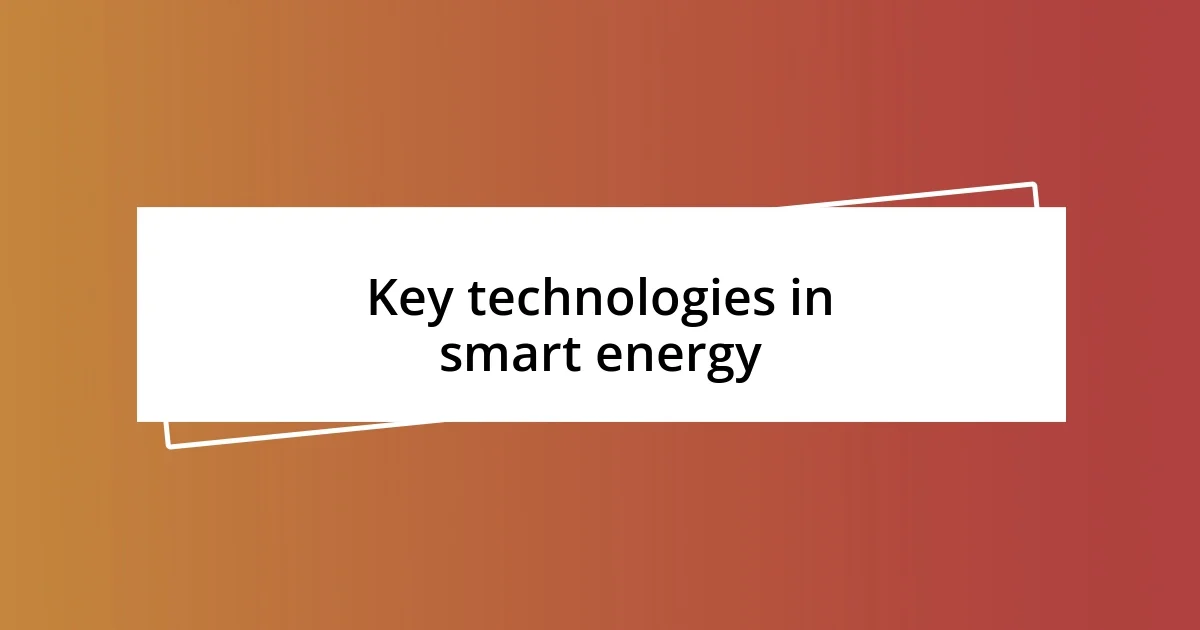
Key technologies in smart energy
One of the standout technologies in smart energy is the Internet of Things (IoT). I remember visiting a smart grid facility where IoT devices worked together to regulate energy flow efficiently. The interconnectivity allowed for such dynamic management that it left me inspired by its potential to revolutionize energy efficiency in both homes and industries.
Another pivotal player in this realm is Artificial Intelligence (AI). I had a chance to experiment with an AI-powered energy management system during a workshop, and the way it analyzed consumption patterns blew my mind! It provided actionable insights that helped optimize energy use, reducing waste in a matter of days. This experience taught me just how indispensable AI can be in making our energy consumption smarter.
And let’s not forget about energy storage technologies, such as batteries. I’ve seen firsthand during a community solar project how energy storage enables communities to use solar power even when the sun isn’t shining. This capability not only stabilizes energy supply but also maximizes the benefits of renewable resources. Such advancements are not just critical; they’re pivotal for a sustainable future, and I genuinely believe they hold the key to powering our lives responsibly.
| Technology | Purpose |
|---|---|
| IoT | Enables real-time monitoring and optimized energy flow. |
| AI | Analyzes consumption patterns for efficiency improvements. |
| Energy Storage | Allows utilization of renewable energy beyond its generation time. |
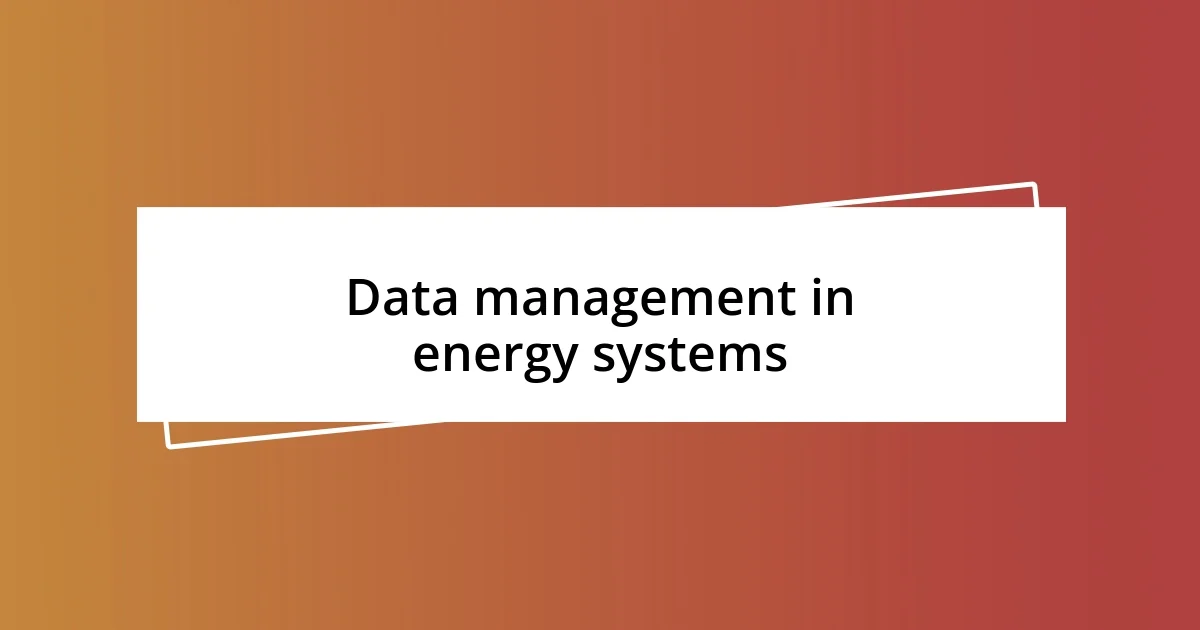
Data management in energy systems
Effective data management is crucial in smart energy systems, allowing us to harness the power of information for better decision-making. I recall a time when I visited a data center for a local utility company; the sheer amount of data generated by their smart meters was astonishing. It made me realize how important it is to process and analyze this information to predict demand and optimize energy distribution effectively.
What struck me about their approach was the integration of data analytics tools. They transformed raw data into actionable insights, helping not only the company but also consumers manage their energy consumption better. In one instance, I watched operators use real-time data to immediately identify inefficient energy use on the grid. This direct link between data management and efficiency optimization truly drove home how critical it is to have a skilled team analyzing trends.
Moreover, the privacy aspect of data management in energy systems cannot be overstated. There’s always a lingering concern about how data is collected and utilized. During a community forum, I voiced my own reservations about data privacy, only to find that the energy providers had extensive measures in place to ensure user data was secure and used ethically. This interaction wrapped up my thoughts by highlighting that transparency in data handling can significantly enhance public trust in smart energy systems. Isn’t it fascinating how data, when handled properly, can empower us and transform our energy landscape?
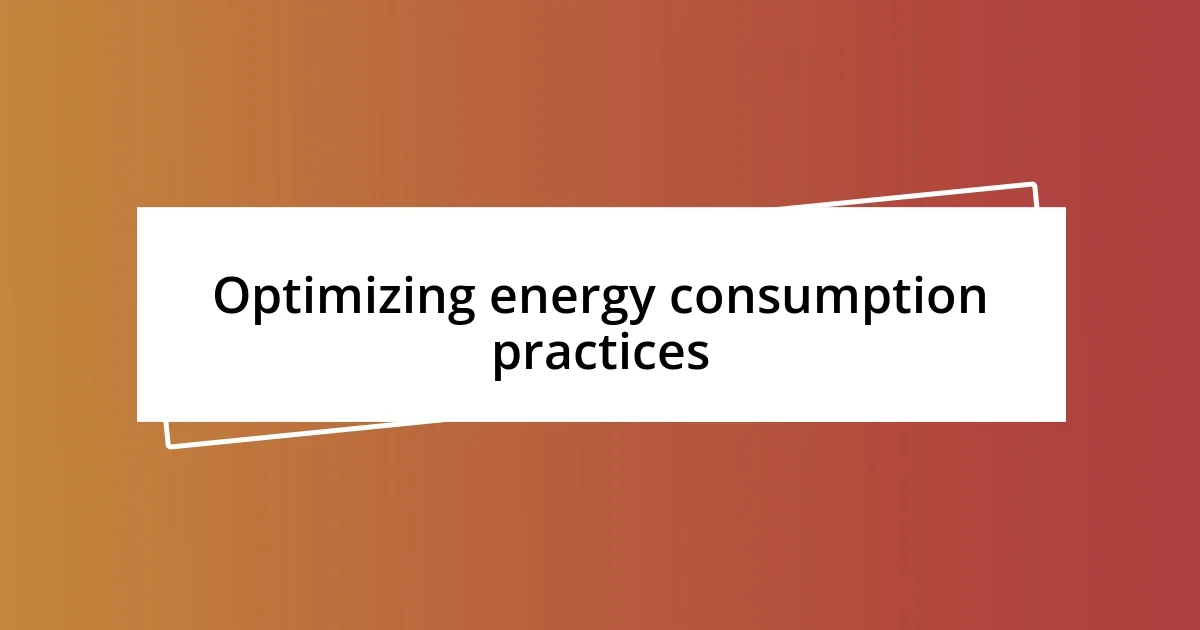
Optimizing energy consumption practices
Optimizing energy consumption practices starts with understanding your usage patterns. I often share a story about how, during a home energy audit, I discovered that my old refrigerator was a major energy hog. It was a real eye-opener for me! By simply upgrading to a more efficient model, I not only reduced my utility bill but also felt good doing my part for the environment. Have you ever considered how much energy your appliances use?
I believe that implementing smart technologies can dramatically change how we consume energy. For instance, I once set up a smart thermostat in my home, and it was incredible to see how it learned my routine and adjusted the temperature accordingly. I honestly didn’t realize how much energy I was wasting just by neglecting manual adjustments. If you’re still relying on manual systems, isn’t it time to rethink your approach?
Engaging in energy-efficient practices doesn’t just stop at technology; it also involves behavioral changes. I found that simply becoming more aware of my energy consumption prompted me to unplug devices when not in use and even switch off lights as I moved through the house. Small habits like these collectively make a huge difference. Have you started any energy-saving habits in your daily life?
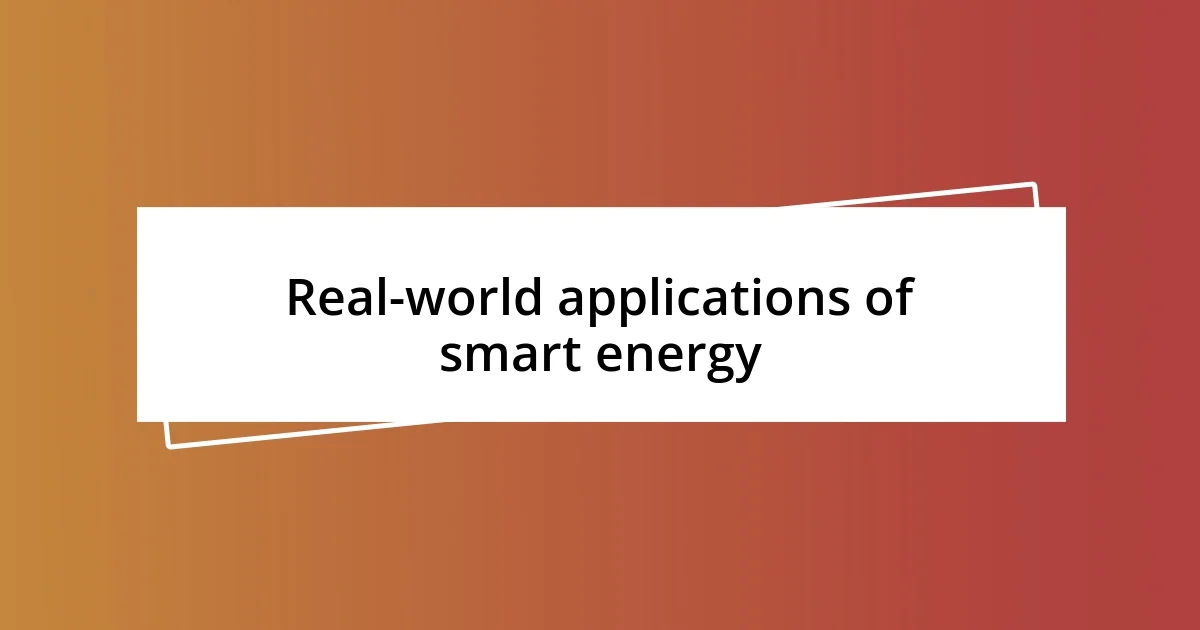
Real-world applications of smart energy
One of the most inspiring real-world applications of smart energy systems that I’ve encountered is in the realm of renewable energy integration. I once visited a local solar farm that utilized smart energy systems to maximize energy capture. It was remarkable to see how they adjusted solar panel angles in real-time, depending on sunlight intensity and weather conditions. Witnessing this firsthand underscored how technology can optimize renewable resources to generate clean energy more efficiently. Have you ever thought about how small adjustments can lead to significant energy savings?
Another application that stood out to me is the use of electric vehicle (EV) charging networks powered by smart energy technologies. I remember when I first charged my EV at a rapid charging station that dynamically adjusted its output based on the grid’s real-time energy supply. This balancing act not only speeds up the charging process but also reduces strain on the grid during peak demand times. It’s a game-changer, isn’t it? These systems exemplify how smart energy solutions can promote sustainable transportation while ensuring grid resilience.
In smart buildings, I’ve witnessed how energy management systems optimize energy use without sacrificing comfort. During a tour of a high-tech office building, I was struck by how occupants could easily adjust lighting and temperature via a smart app. The automated systems would then adjust based on real-time occupancy data, significantly cutting down on energy waste. How empowering is it to have such control at our fingertips? These smart applications not only enhance the user experience but also contribute to broader energy efficiency goals.












